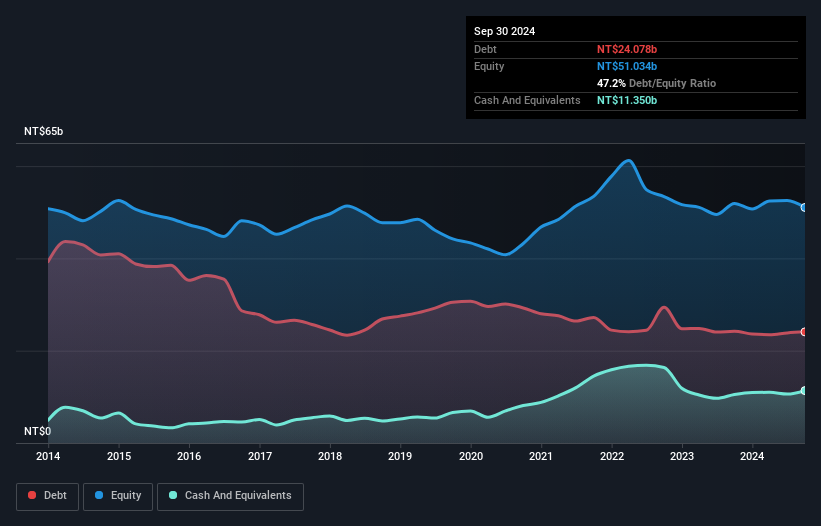We Think Taiwan Glass Ind (TWSE:1802) Has A Fair Chunk Of Debt

Warren Buffett famously said, 'Volatility is far from synonymous with risk.' So it might be obvious that you need to consider debt, when you think about how risky any given stock is, because too much debt can sink a company. We note that Taiwan Glass Ind. Corp. (TWSE:1802) does have debt on its balance sheet. But the real question is whether this debt is making the company risky.
What Risk Does Debt Bring?
Debt is a tool to help businesses grow, but if a business is incapable of paying off its lenders, then it exists at their mercy. Ultimately, if the company can't fulfill its legal obligations to repay debt, shareholders could walk away with nothing. However, a more usual (but still expensive) situation is where a company must dilute shareholders at a cheap share price simply to get debt under control. Having said that, the most common situation is where a company manages its debt reasonably well - and to its own advantage. When we think about a company's use of debt, we first look at cash and debt together.
View our latest analysis for Taiwan Glass Ind
What Is Taiwan Glass Ind's Debt?
As you can see below, Taiwan Glass Ind had NT$24.1b of debt, at September 2024, which is about the same as the year before. You can click the chart for greater detail. However, it does have NT$11.3b in cash offsetting this, leading to net debt of about NT$12.7b.

How Strong Is Taiwan Glass Ind's Balance Sheet?
Zooming in on the latest balance sheet data, we can see that Taiwan Glass Ind had liabilities of NT$27.6b due within 12 months and liabilities of NT$12.3b due beyond that. Offsetting these obligations, it had cash of NT$11.3b as well as receivables valued at NT$11.8b due within 12 months. So its liabilities total NT$16.7b more than the combination of its cash and short-term receivables.
This deficit isn't so bad because Taiwan Glass Ind is worth NT$53.8b, and thus could probably raise enough capital to shore up its balance sheet, if the need arose. But it's clear that we should definitely closely examine whether it can manage its debt without dilution. When analysing debt levels, the balance sheet is the obvious place to start. But it is Taiwan Glass Ind's earnings that will influence how the balance sheet holds up in the future. So if you're keen to discover more about its earnings, it might be worth checking out this graph of its long term earnings trend.
Over 12 months, Taiwan Glass Ind made a loss at the EBIT level, and saw its revenue drop to NT$43b, which is a fall of 4.5%. We would much prefer see growth.
Caveat Emptor
Over the last twelve months Taiwan Glass Ind produced an earnings before interest and tax (EBIT) loss. To be specific the EBIT loss came in at NT$728m. When we look at that and recall the liabilities on its balance sheet, relative to cash, it seems unwise to us for the company to have any debt. Quite frankly we think the balance sheet is far from match-fit, although it could be improved with time. We would feel better if it turned its trailing twelve month loss of NT$937m into a profit. So in short it's a really risky stock. When analysing debt levels, the balance sheet is the obvious place to start. But ultimately, every company can contain risks that exist outside of the balance sheet. To that end, you should learn about the 2 warning signs we've spotted with Taiwan Glass Ind (including 1 which is a bit unpleasant) .
If, after all that, you're more interested in a fast growing company with a rock-solid balance sheet, then check out our list of net cash growth stocks without delay.
Valuation is complex, but we're here to simplify it.
Discover if Taiwan Glass Ind might be undervalued or overvalued with our detailed analysis, featuring fair value estimates, potential risks, dividends, insider trades, and its financial condition.
Access Free AnalysisHave feedback on this article? Concerned about the content? Get in touch with us directly. Alternatively, email editorial-team (at) simplywallst.com.
This article by Simply Wall St is general in nature. We provide commentary based on historical data and analyst forecasts only using an unbiased methodology and our articles are not intended to be financial advice. It does not constitute a recommendation to buy or sell any stock, and does not take account of your objectives, or your financial situation. We aim to bring you long-term focused analysis driven by fundamental data. Note that our analysis may not factor in the latest price-sensitive company announcements or qualitative material. Simply Wall St has no position in any stocks mentioned.
About TWSE:1802
Taiwan Glass Ind
Engages in the manufacturing, processing, and selling of various glass products in Taiwan, China, and internationally.
Excellent balance sheet and overvalued.
Similar Companies
Market Insights
Community Narratives



